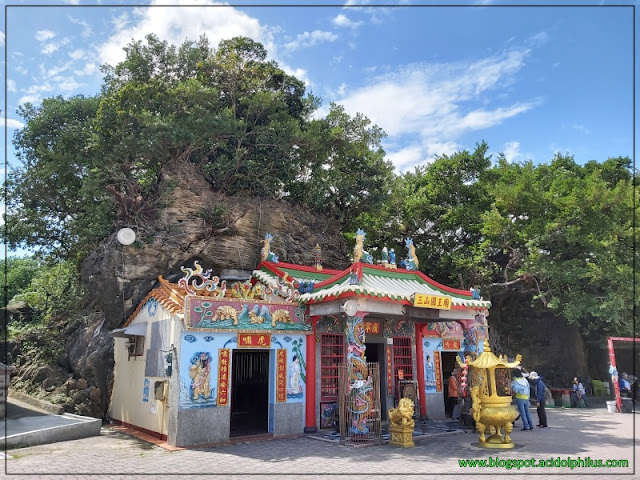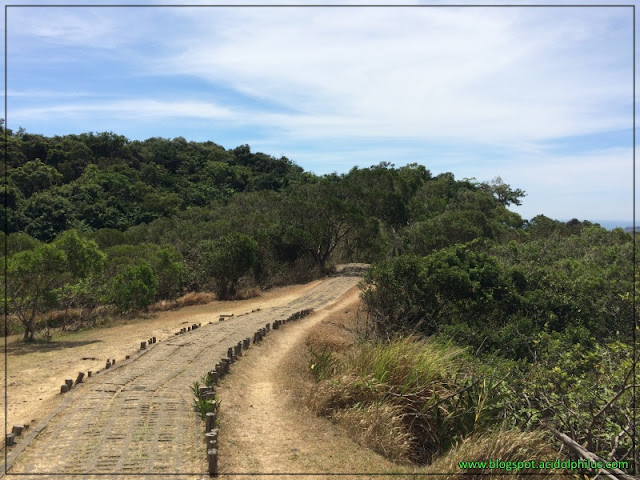Day One, 7:35 A.M.
1. Where were you yesterday?
It depends on what time of day we're discussing. In the early morning I was in our apartment in Taitung. After that I was at one of the Taitung McDonald's eating breakfast. After that I was in the Taitung immigration office, renewing my ARC, and after that I was at the Danti Hot Spring in Jinluen. After that I was in the house we're renting in Fangliao. It was a busy day.
2. What did you do yesterday?
As I just said I ate breakfast, renewed my ARC and drove around a lot. Why are you so confrontational, Danny? Is it because most of the third graders spell your name wrong? Oh, and I also read part of a novel, 2312, before going to bed.
3. What's your favorite season?
I don't think I have a favorite season in Taiwan. Spring? Not really. Summer? Not really. I like that 1-2 month period when the weather turns warmer, but not the months that are truly hot. I like sunshine for sure. I get depressed on cloudy days.
If we're talking about Seattle, where I'm from, I'd definitely go with summer. Getting through winter and spring in that part of North America can be a struggle. When the sun finally does come out there it feels glorious.
4. How much is the T-shirt?
Niki, please get that T-shirt out of my face. I don't know. I get all of my T-shirts from either schools where I work or half marathons I join. I haven't bought a T-shirt in a long time.
Day Two, 10:34 P.M.
Can you loosen the ropes, please? I'm losing the feeling in my arms.
5. Where are you from?
I'm from Seattle, Washington, in the U.S.A. I also spent a lot of my childhood in Bay City, Oregon, where my grandma lived until her death in the early 90s.
I think if you asked my mother where she's from she'd say Montana. Maybe Illinois? My dad's from Seattle, and aside from a trip he took to the U.K. in the 1970s I don't think he's lived anywhere else.
6. How do you go to school?
It depends on the day. On Mondays, Tuesdays, Thursdays and Fridays I ride a bike to either Fangliao or Yuguang elementary school. On Wednesdays I ride a scooter to Fangliao in the morning, ride it Yuguang for my English club after lunch, and at 4 o'clock I ride home. It's too far between my house and the two schools for a bike ride to be practical that day.
Sometimes I have a class at Nanzhou Junior High School on Saturday morning. When I have that class I drive a car. Riding a scooter between Fangliao and Nanzhou is exhausting.
7. What do you do after school?
On Mondays, Tuesdays and Thursdays I read a book. I also go running on Tuesday and Thursday evening. On Wednesdays I watch a movie. This semester all the movies I've seen have been from the 1970s. On Fridays I drink beer in combination with whatever else I'm doing.
8. What time do you get up?
I think you know what time I get up, Owen. The five of you were here, waiting for me, while I was on my way to work.
I usually get up at 6:30. I sometimes hate this about myself, but my body is like an alarm clock, and it always wakes me up if I have something to do the next day. You could tell me that I have somewhere I need to be at 5 A.M. the following day, and I'd probably wake up at 4:30 the following morning without meaning to.
Day Three, 11:22 A.M.
9. What day is today?
Please turn the hose off, Irene. I'll answer any questions. Just no more hose.
Today is... Today is... I dunno, I've been in here for too long. I think it's Thursday?
10. What do you want for dinner?
If you let me go, we're having dinner in Chaozhou tonight. I'm not sure what I want to eat up there. I'm tired of the hot pot, and also tired of the pizza. Ditto for McDonald's, which is never that good anyway. If I had to pick right now I'd pick steak.
11. Do you have PE class on Monday?
No, I'm an English teacher. Come on, guys! You know that! That's how we know each other, remember? Dino on the Go? Grades 4 to 6? We've known each other for so many years already! Why are you pretending?
12. Whose cap is this?
It's my cap. I wear it to school every day. It keeps the sun out of my eyes when I'm riding down the hill from my house.
Day Four, 3:14 P.M.
13. How's the weather?
It's cloudy today. We're at that turning point between spring and summer. The weather can't decide if it wants to be hot with clear skies or hot/humid with occasional rain. My eyes often feel dry and itchy. I can't tell if it's an allergy or just the weather. I had the same feeling this time last year, but it was much worse then.
14. Where are you going?
I'm not going anywhere. You guys have tied me to a chair! Can I go, please?
15. How many lions are there?
I don't see any lions. All I see is several deranged children and a dinosaur. I might be hallucinating.
16. What's wrong?
I've been stuck in this shack for four days answering questions from the English textbooks. I can't get the feeling back in my arms. Dino looks very hungry, and during the past four days he may have developed an appetite for human flesh. I just want to go teach my English classes. Don't worry, while I'm doing so I'll namedrop you guys as much as possible.
Day Five, 3:00 A.M.
17. What time is it?
I'm trying... I don't know. It's dark outside. It might be night or early morning. I really don't know. What's the gun for, Niki? Please, let me go.
18. What are you doing?
I'm not doing anything. I swear, I don't know why you brought me here. Is it because I sometimes also use the Follow Me and Here We Go textbooks? That really wasn't my decision. It was the school's. You guys are the best, really. Please let me go. We can switch the third graders back to Dino on the Go next year. I promise.
19. Where are you?
I'm in Jiadong. I know I'm in Jiadong. I can hear the highway. I can hear those dogs that live in the cemetery on the other side of the field. Niki--- I swear, please put the gun away. I won't tell anyone. I'll be good, I'll be so good. You'll see.
20. Where's my kite?
I don't know about any kite. I---
Wait a second, do you hear that? The police are here! They found me! WHERE'S YOUR CELL PHONE, Danny? Did you lose track of it somewhere? Ha ha ha, you guys are in for it, now! We're here! We're here! We're here!
We're---
Related Entries:
Postscript: Did the author of this blog survive the police raid? Did Dino, Danny, Owen, Niki and Irene pay for their crimes? Will Taiwan's "Bilingual Nation 2030" be achieved? For the answers the these and other questions visit next week, where the truth will be revealed!


































